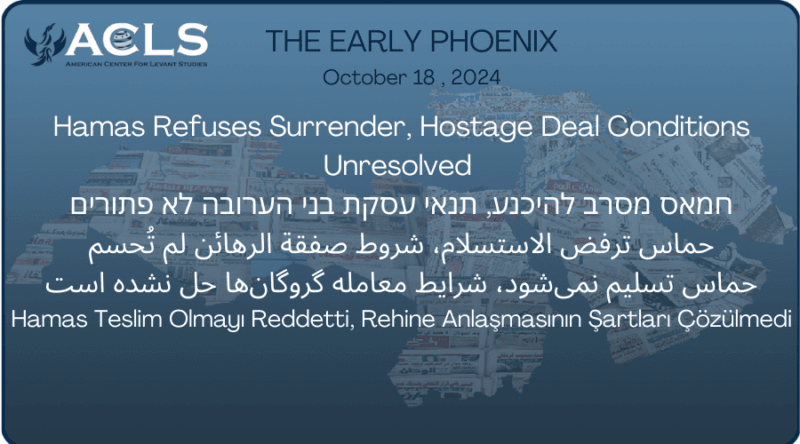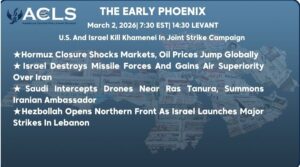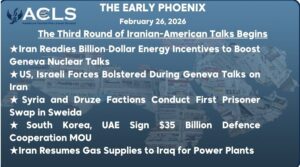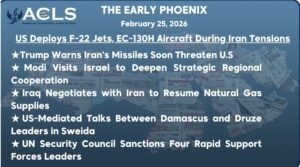
Top Five:
★ 62 Palestinians Killed in Israeli Airstrikes on Jabalia
★ Muslim Brotherhood Lauds Dead Sea Attack
★ Mohammad Sinwar Expected to Lead Hamas After Yahya’s Death
★ Putin Offers Mediation Between Israel and Iran Conflict
★ UNICEF: One Million Gaza Children Facing Hellish Conditions
==========
★ ISRAEL-HAMAS WAR
-
62 Dead in Israeli Airstrikes, Hamas Claims Soldier Deaths
Israeli airstrikes on Jabalia camp killed 62 Palestinians, cutting communication networks. The strikes coincided with Israeli military advances, part of a two-week operation that has killed 450 Palestinians. An Israeli soldier was seriously injured in the clashes. Hamas’s Al-Qassam Brigades released footage showing Israeli troops lured into a booby-trapped house near Jabalia, killing them in the explosion.
-
Muslim Brotherhood Praises Dead Sea Attack, Jordan Treads Cautiously
The Muslim Brotherhood’s Islamic Action Front praised an attack near the Dead Sea, claiming two Jordanian men killed by Israeli forces avenged actions in Gaza. The group labeled the attackers as “martyrs,” gaining support from Jordanian youth. Israel heightened border security after the breach, which injured two Israeli soldiers. Jordan quickly distanced itself from the attack, denying involvement and launching an investigation to avoid regional destabilization. The incident adds further tension to already strained Israel-Jordan relations as both countries navigate the escalating regional conflict.
-
Sinwar’s Death Reveals Internal Hamas-Iran Disputes And Prisoner Swap
Yahya Sinwar, the Hamas leader killed in an Israeli military operation, had resisted Iranian recommendations and opposed direct coordination with Tehran. Sinwar criticized Iran for insufficient support, leading to internal Hamas disputes, particularly with external leaders. Al Arabiya sources revealed that before his death, Sinwar submitted recommendations for a prisoner swap deal and rejected an offer to leave Gaza with his family in exchange for hostages. Senior Hamas leader Khalil Al-Hayya emphasized Hamas’s continued fight for a Palestinian state and conditioned the release of Israeli hostages on a ceasefire and Israeli withdrawal.
-
Yahya Sinwar’s Body Moved to Secret Location in Israel
Israeli authorities confirmed Yahya Sinwar’s body, killed in Rafah, was moved to a secret location after undergoing an autopsy. The autopsy was conducted at Abu Kabir Forensic Institute, confirming Sinwar’s identity and a fatal gunshot wound to the head. Officials stated the body may be used as leverage in negotiations for the release of Israeli prisoners held in Gaza. It remains unclear whether Sinwar will be buried in a secret grave or kept in a refrigerated facility. Sinwar’s death occurred after a three-stage operation involving Israeli forces targeting his location and ensuring his death.
-
Mohammad Sinwar Expected to Lead Hamas After Brother Yahya’s Death
Israeli security officials believe Mohammad Sinwar will replace his brother Yahya Sinwar as the new leader of Hamas. Khalil al-Hayya, Yahya Sinwar’s deputy, is expected to take over political responsibilities within Hamas following the leadership change. Born in 1975 in the Khan Yunis refugee camp, Mohammad Sinwar has been deeply involved in Hamas’s militant activities. His family fled a village near Ashkelon in 1948, a key factor in the Sinwar brothers’ hatred toward Israel. Mohammad Sinwar’s close ties to Yahya have elevated his status within Hamas and Israel’s security assessments.
==============
★ ISRAEL-HEZBOLLAH WAR
-
IDF Destroys Hezbollah Command Center, Raids Weapons Tunnel
On October 18, 2024, the IDF destroyed Hezbollah’s regional command center in southern Lebanon, killing four fighters. The 188th Brigade also decommissioned a tunnel filled with weapons and documents.
-
IDF Reports Five Soldiers Seriously Wounded in Lebanon and Gaza
The IDF reported that four soldiers were seriously injured in Lebanon, including three from the elite Maglan unit who were mistakenly hit by an Israeli tank shell during operations in southern Lebanon. An additional reservist was wounded on the Lebanon border.
-
Lebanon Condemns Iran for Interference Over UN Resolution
Prime Minister Najib Mikati condemned Iran’s interference after Iranian parliament speaker Mohammad Bagher Ghalibaf commented on UN Resolution 1701, which limits military presence in southern Lebanon. Mikati stated that only Lebanon should handle its implementation and summoned Iran’s Chargé d’Affaires for clarification. Iran denied the remarks and affirmed support for Lebanon’s decisions.
-
Meloni Urges Stronger UNIFIL, Condemns Attacks on Peacekeepers
Meloni urged strengthening UNIFIL during her Beirut visit, condemning recent attacks on its personnel. She emphasized UNIFIL’s impartiality for peace. Israel accused Hezbollah of using UN positions to target Israeli forces, but denied targeting peacekeepers. Both Meloni and Mikati stressed diplomacy and urged Lebanon to avoid regional conflicts.
-
UN Peacekeepers Refuse Israeli Evacuation Demands During Rising Tensions
UNIFIL peacekeepers refused to evacuate despite Israeli demands, backed by 50 countries and the UN Security Council. Israeli attacks and Hezbollah rocket fire endangered peacekeepers, with two injured in a recent Israeli strike. Despite halted patrols, UNIFIL reports suspicious activities to the Security Council.
-
UNICEF: One Million Gaza Children Facing “Hell on Earth”
UNICEF reported that Gaza is a “hell on earth” for one million children, with 35 to 40 killed daily since October 7, 2023. More than 14,100 children have died, and survivors endure displacement, deprivation, and unsafe living conditions. The crisis, worsened by airstrikes and overcrowded camps, continues to escalate.
============
★ IRAN
-
Soleimani Pledged Full Support to Hamas During 2012 Visit
In 2012, Hamas leaders Yahya Sinwar and Ismail Haniyeh visited Tehran, where they met Iran’s Supreme Leader Ali Khamenei and Qassem Soleimani. Soleimani, head of the Quds Force at the time, pledged Iran’s full support for Hamas, offering all available resources to assist their struggle. In a 2017 speech, Sinwar confirmed Soleimani’s commitment, stating that Iran placed no conditions on Hamas and promised to deploy all capabilities in their efforts to make Jerusalem the Palestinian capital.
-
Putin Offers Mediation Between Israel and Iran, Ready to Help
Russian President Vladimir Putin expressed Russia’s willingness to mediate between Israel and Iran, stating that despite the challenges, compromises could be possible. Putin highlighted Russia’s “trusting relations” with both countries and emphasized the need to halt the ongoing exchange of attacks. He noted that if both sides requested it, Russia would assist in seeking peaceful solutions. This offer comes as the region braces for Israel’s response following Iranian missile attacks and the decapitation of the leadership of Iran’s allies, Hamas and Hezbollah, by Israeli forces.
-
Trump Suggests No Pursuit of Iran Regime Change, Focuses on Nuclear Issue
In a recent interview, Republican presidential nominee Donald Trump indicated he would not seek regime change in Iran if re-elected, emphasizing that his primary concern is preventing Iran from obtaining nuclear weapons. Speaking with Iranian-American podcaster Patrick Bet-David, Trump expressed a desire for Iran to succeed economically but ruled out deeper involvement in changing its political system. Trump highlighted his previous pressure on China to stop buying Iranian oil during his presidency and hinted at potentially different strategies for Iran moving forward. His stance appears to soften from his earlier hardline approach, advocating for a deal with Iran while maintaining opposition to its nuclear ambitions.
-
West Urged to Deliver Ultimatum to Iran for Regime Change
In an opinion piece, Kaveh Shahrooz argues the West should present Iran’s regime with a choice: either allow a free and democratic Iran or face military action. Shahrooz suggests two options—supporting a “people-led regime change” by funding opposition groups and Iranian workers or issuing an ultimatum to Iran’s military leadership, offering exile in exchange for a peaceful transition. He emphasizes the regime’s vulnerability due to weakened proxies and internal dissent, advocating for this approach to secure long-term stability without a costly war.
-
Israel Prepares Targeted Strikes in Response to Iran Missile Attack
Israel’s war cabinet finalized plans to strike Iranian military and intelligence sites in response to Iran’s October 1 missile attack. Coordinated with the U.S., these strikes will avoid oil and nuclear facilities to prevent escalation. The focus will be on the Islamic Revolutionary Guard Corps and missile manufacturing sites. Israel is debating whether to publicize the strikes or keep them covert, with some believing Iran may not retaliate if the attacks remain unpublicized.
============
★ SYRIA
-
Explosions Reported at US Base in Syria’s Hasaka Province
Several explosions were heard on October 17, 2024, at a U.S. military base in al-Shadadi, Hasaka province, northeastern Syria. The local media in Syria reported the blasts, though the cause remains unknown. The base is considered illegal by Syrian authorities. No further details were available at the time.
-
IAF Intercepts Projectiles from Lebanon and Suspicious Target from Syria
The Israel Air Force (IAF) intercepted three projectiles launched from Lebanon toward Haifa and the Upper Galilee on Friday evening. Sirens were activated in the areas before the interceptions. Additionally, the IAF intercepted a suspicious aerial target approaching from Syria before it crossed into Israeli territory. The IDF confirmed both incidents, citing ongoing security operations along Israel’s northern borders as tensions in the region continue to rise.
-
Israel Increases Security at Golan Heights Syrian Border
Israeli forces enhanced defenses at the Golan Heights border, clearing mines and setting up barriers to prevent Hezbollah-linked militant threats. The Israeli Defense Forces aim to secure the northeastern frontier, creating a monitoring zone to prevent infiltration. Sources suggest operations may extend near the Lebanese border to address regional risks.
-
Damascus Sends Reinforcements to Northern Syria
Five military trucks loaded with weapons crossed the Homs-Hama highway toward northern Syria, escorted by armed vehicles. The Assad regime is claiming that Syrian opposition groups are reportedly planning an offensive on government positions. On October 9, Damascus deployed reinforcements to western Aleppo and Idlib, including Special Task Forces, tanks, and heavily armed vehicles.
-
Assad Regime Attempts to Rebrand During Shifting Dynamics
U.S. former Envoy to Syria and Founder of ACLS, Joel Rayburn, stated that the Assad regime lacks the military strength to confront Turkey. He emphasized the regime’s reliance on Hezbollah’s dwindling influence on the battlefield. As Hezbollah’s role diminishes, Rayburn highlights the crucial question of whether the military link between Iran and Hezbollah can be broken. He stressed that this will depend on developments in Lebanon, rising tensions between Israel and Iran, and the outcome of the U.S. presidential election. The election could bring two starkly different Middle East policies. Rayburn also pointed out Assad’s efforts to rebrand by positioning himself as capable of disrupting the Iran-Hezbollah connection. Some Arab nations and European countries, like Italy, are reportedly considering this narrative, seeing possible benefits for facilitating refugee returns. However, Rayburn warned that the northern Middle East remains uncertain, with significant changes expected in the coming month.
============
★ YEMEN
-
Australia Supports U.S. Strikes on Yemen Houthi Targets Using B-2 Bombers
Australia confirmed its support for U.S. airstrikes on Houthi weapons storage sites in Yemen on October 17, 2024, providing airspace and refueling access for B-2 bombers. The strikes, part of U.S.-Australian military cooperation, targeted fortified bunkers used by Ansarullah forces. However, Press TV reported that the airstrike failed to hit the intended targets, citing Yemeni military experts who claim the operation was ineffective. Despite this, Ansarullah vowed to continue its resistance against the U.S. and Israel.
===============
★ GULF NATIONS
-
Riyadh Season Launches with Concert and Boxing Matches
The fifth edition of Riyadh Season began on Saturday with a grand event featuring international artists and boxing matches at the Kingdom Arena. This year’s season spans 1,778 acres and offers new experiences in areas like Boulevard World and Boulevard City. The opening concert featured Arab stars, including the return of Saudi artist Jawad Al Ali after a decade. Fouad Abdel Wahed and Ayed Yousef also performed, thrilling the audience with their performances. The season promises more concerts and unique events across multiple venues.
============
★ Turkiye
-
Fidan and Hamas Officials Discuss Gaza Cease-Fire in Istanbul
Turkish Foreign Minister Hakan Fidan met with Hamas officials, including Shura Council Chairman Mohammed Ismail Darwish, in Istanbul to discuss Gaza’s situation a day after Yahya Sinwar’s elimination. Talks focused on a cease-fire and prisoner exchanges, as well as the humanitarian crisis in northern Gaza. Fidan emphasized Türkiye’s commitment to using diplomatic means to engage the international community. He also extended condolences for the death of Hamas leader Yahya Sinwar and praised Egypt’s recent efforts in peace negotiations.
-
Erdogan Holds Meeting with Foreign Ministers of Four Nations
President Erdoğan met with the foreign ministers of Azerbaijan, Armenia, Iran, and Russia at the Dolmabahçe Presidential Office, urging the UN to impose an arms embargo on the Zionist entity. He argued that such a move would be an effective solution to stop regional instability and aggression in Gaza. The proposal came during discussions at a regional cooperation platform meeting in Istanbul, reflecting Turkiye’s diplomatic efforts to secure international action against the Zionist entity.
-
Erdogan-Scholz Talks Focus on Eurofighter Deal and Asylum Issues
German Chancellor Olaf Scholz is set to visit Turkiye for discussions with President Recep Tayyip Erdogan on bilateral and regional issues, including Turkiye’s interest in acquiring Eurofighter Typhoon jets. Talks will also address Schengen visa challenges faced by Turkish citizens and Germany’s plan to repatriate 13,500 Turkish asylum seekers whose applications were rejected. In addition, the meeting will cover broader topics such as Turkiye-EU relations, NATO, and the Russian-Ukrainian war. Disagreements over the Israeli-Palestinian conflict, particularly Germany’s support for Israel, remain points of contention between the two leaders.
===========



